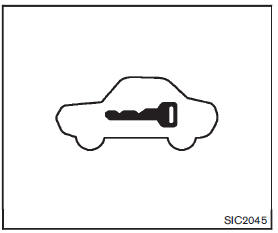Nissan Juke Owners Manual : Vehicle Security System
The vehicle security system provides visual and audio alarm signals if someone opens the doors, or lift gate when the system is armed. It is not, however, a motion detection type system that activates when a vehicle is moved or when a vibration occurs.
The system helps deter vehicle theft but cannot prevent it, nor can it prevent the theft of interior or exterior vehicle components in all situations.
Always secure your vehicle even if parking for a brief period. Never leave your keys in the vehicle, and always lock it when unattended. Be aware of your surroundings, and park in secure, well-lit areas whenever possible.
Many devices offering additional protection, such as component locks, identification markers, and tracking systems, are available at auto supply stores and specialty shops. Your NISSAN dealer may also offer such equipment.
Check with your insurance company to see if you may be eligible for discounts for various theft protection features.

How to arm the vehicle security system
1. Close all windows.
The system can be armed even if the windows are open.
2. Models with Intelligent Key system: Place the ignition switch in the OFF position and remove the Intelligent Key from the vehicle.
Models without Intelligent Key system: Place the ignition switch in the LOCK position and remove the key.
3. Close all doors. Lock all doors. The doors can be locked with:
• the LOCK  button on the keyfob
button on the keyfob
or Intelligent Key (if so equipped)
• any request switch (Intelligent Key equipped model)
• the power door lock switch
• the key — master or mechanical (Intelligent Key equipped model)
4. Confirm that the security indicator light illuminates. The security indicator light stays on for about 30 seconds. The vehicle security system is now pre-armed. After about 30 seconds the vehicle security system automatically shifts into the armed phase. The security light begins to flash once every approximately 3 seconds. If, during this 30-second pre-arm time period, the door is unlocked, or the ignition switch is placed in the ACC or ON position, the system will not arm.
Even when the driver and/or passengers are in the vehicle, the system will activate with all doors locked with the ignition switch in the LOCK position. When turning the ignition switch to the ACC or ON position, the system will be released.
Vehicle security system activation The vehicle security system will give the following alarm:
• The headlights blink and the horn sounds intermittently.
• The alarm automatically turns off after approximately 50 seconds. However, the alarm reactivates if the vehicle is tampered with again.
The alarm is activated by:
• Unlocking the door without using the keyfob, the Intelligent Key (if so equipped) the request switch (if so equipped) or the key.
(Even if the door is opened by releasing the door inside lock knob, the alarm
will activate.) How to stop an activated alarm The alarm will stop by unlocking
a door by pushing the UNLOCK  button
button
on the keyfob or Intelligent Key, pushing the request switch or using the key. The
alarm will not stop if the ignition switch is placed in the ACC or ON position.
If the system does not operate as described above, have it checked by a NISSAN dealer.
 Security systems
Security systems
Your vehicle has two types of security systems, as follows:
• Vehicle security system
• NISSAN Vehicle Immobilizer System
The security condition will be shown by the security indicator light. ...
 NISSAN Vehicle Immobilizer System
NISSAN Vehicle Immobilizer System
The NISSAN Vehicle Immobilizer System will not allow the engine to start without
the use of the registered key.
If the engine fails to start using the registered key, it may be due to interference ...
Other materials:
Rear fog lamp
Exploded View
REMOVAL
1. Rear fog lamp
DISASSEMBLY
1. Rear fog lamp housing
2. Rear fog lamp bulb
3. Rear fog lamp bulb sock
Removal and Installation
CAUTION:
Disconnect battery negative terminal or remove the fuse.
REMOVAL
1. Insert any appropriate tool into the gap between the rea ...
B1042, B1043, B1044, B1045, B1046, B1047 diagnosis sensor unit
DTC Logic
DTC DETECTION LOGIC
DTC CONFIRMATION PROCEDURE
1.CHECK SELF-DIAG RESULT
With CONSULT-III
1. Turn ignition switch ON.
2. Perform “Self Diagnostic Result” mode of “AIR BAG” using CONSULT-III.
Without CONSULT-III
1. Turn ignition switch ON.
2. Check the air bag warning lamp statu ...
Compressor dose dot operate
Description
SYMPTOM
Compressor dose not operate.
Diagnosis Procedure
NOTE:
• Perform self-diagnosis with CONSULT-III before performing symptom diagnosis.
If any malfunction result or
DTC is detected, perform the corresponding diagnosis.
• Check that refrigerant is enclosed in cooler cycle n ...
